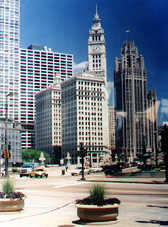Environmental History: People on the Land
• A weekly index



|
Environmental History: People on the Land • A weekly index |
||
 |

|
 |
|
Overview of the Class
|
|||
|
The American experience is a varied quilt, if not a perfected tapestry of designs, because the quilt pattern was born of the need to settle a physiographically diverse continent, inhabit often distant outposts, and connect new trading posts to the commercial networks of Europe, Asia and Africa. As the landscape was settled, the terrain was transformed. Water, air and land was converted to commercial, extractive, or residential uses. Wildlife, fisheries and and non-game species were affected by grazing, timber, and plantation agriculture, in addition to settlements. From this transformation a new set of perceptions, ideologies and values arose that led to preservation, conservation and protection of the health and ecology of the nation. This course is about that story of conquest, dispossession, scenic monumentalism, commercial use and regeneration of our cultural geography. |
T. Cole, 1827, The White Mountains |
||
|
Environmental History is the study of how settlements alter ecological conditions and how those changes influence each era’s ideas about nature with respect to responsible resource use from one period to the next. Ideas meaning those concepts associated with the perception, ideology and values that contribute to methods of discovery with respect to our surrounding land, air and water. |
|||
| Weekly discussion focus and linked topics for ENV-380.01 |
J.
Siry, Ph.D.
|
||
|
Time
:30
- :45
|
646-2648
|
||
What is environmental history?
![]()
The American frontier's landscape heritage, J. V. Siry.
Time, cycles, historic changes
Images of the American landscape
Aboriginal America, the role of Amerindians in Environmental History
Settlements of the Northeast & Southwest were examples of ecological revolutions.
American revolutionary and early Nationalist attitudes about nature, landscape and settlement.
Donald Worster, as a model of an environmental historian
"The land was ours, before we were the lands." Landscape art and the promise of America.
Henry David Thoreau, Ecologist and abolitionist
Civil Disobedience, by Henry David Thoreau
Marc Reisner on reclamation: One, Two, Three.
The Grand Canyon Controversy, related pages
Mary Austin, Land of little Rain: a natural history of the Owen's Valley.
![]()
Merchant's Chronology 1640-1992.
Biological Trends in the United States, an annotated guide.